

Molecular and Cellular Biology, School of. Molecular and Cellular Biology, School of Key measures: Positive Outcomes: 96.6%, Graduate prospects: 83.7%, Graduate employment: 74.5% Graduate destinations: Work Full-time: 47%, Work Part-time: 6%, Work & Study: 2%, Further study: 43%, Unemployed: 2% Top industry sectors: Education; Health & Social Care; Science, Research & Development; Buying, Selling & Retail; Advertising, Marketing & Public Relations.
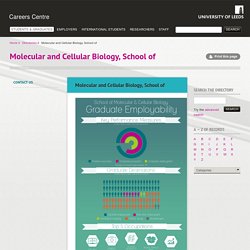
What can I do with a microbiology degree? Employers value the scientific, analytical and problem-solving skills developed by microbiology graduates Job options Jobs directly related to your degree include: Jobs where your degree would be useful include: Remember that many employers accept applications from graduates with any degree subject, so don't restrict your thinking to the jobs listed here.
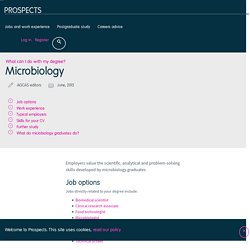
Careers - What microbiologists do. All around the world there are microbiologists making a difference to our lives – ensuring our food is safe, treating and preventing disease, developing green technologies or tracking the role of microbes in climate change.
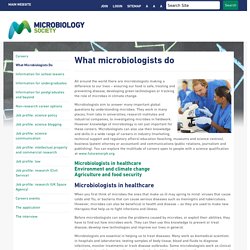
Microbiologists aim to answer many important global questions by understanding microbes. They work in many places, from labs in universities, research institutes and industrial companies, to investigating microbes in fieldwork. However knowledge of microbiology is not just important for these careers. Microbiologists can also use their knowledge and skills in a wide range of careers in industry (marketing, technical support and regulatory affairs) education (teaching, museums and science centres), business (patent attorney or accountant) and communications (public relations, journalism and publishing). You can explore the multitude of careers open to people with a science qualification at www.futuremorph.org. Microbiologists in healthcare. Careers - Information for undergraduates. After studying for a Microbiology degree, there are many options available to you.
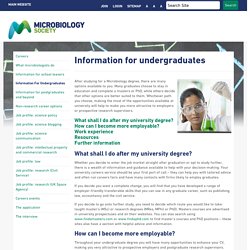
Many graduates choose to stay in education and complete a masters or PhD, while others decide that other options are better suited to them. Whichever path you choose, making the most of the opportunities available at university will help to make you more attractive to employers or prospective research supervisors. What shall I do after my university degree? How can I become more employable? Microbiology Society. Careers - Information for postgraduates and beyond. A postgraduate degree in any aspect of microbiology prepares you for a career in research.
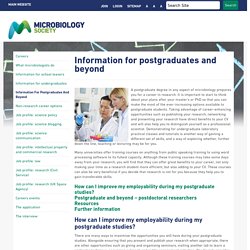
It is important to start to think about your plans after your master's or PhD so that you can make the most of the ever-increasing options available to postgraduate students. Taking advantage of career-enhancing opportunities such as publishing your research, networking and presenting your research have direct benefits to your CV and will also help you to distinguish yourself as a professional scientist. Demonstrating for undergraduate laboratory practical classes and tutorials is another way of gaining a different set of skills, and a way of exploring whether, further down the line, teaching or lecturing may be for you. Many universities offer training courses on anything from public speaking training to using word processing software to its fullest capacity. How can I improve my employability during my postgraduate studies? How can I improve my employability during my postgraduate studies? Careers - Non-research career options. If your passion lies outside the lab it is important to get as much experience as possible in your chosen area.
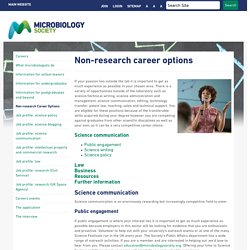
There is a variety of opportunities outside of the laboratory such as science/technical writing, science administration and management, science communication, editing, technology transfer, patent law, teaching, sales and technical support. You are eligible for these positions because of the transferable skills acquired during your degree however you are competing against graduates from other scientific disciplines as well as your own, so it can be a very competitive career choice. Science communication LawBusinessResourcesFurther information. Microbiology & Biotechnology Career InformationSociety for Industrial Microbiology and Biotechnology. Looking for an Exciting Career?
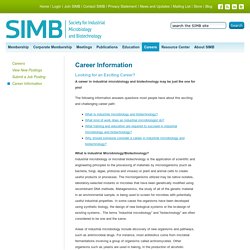
A career in industrial microbiology and biotechnology may be just the one for you! The following information answers questions most people have about this exciting and challenging career path: What is Industrial Microbiology/Biotechnology? Industrial microbiology or microbial biotechnology is the application of scientific and engineering principles to the processing of materials by microorganisms (such as bacteria, fungi, algae, protozoa and viruses) or plant and animal cells to create useful products or processes. The microorganisms utilized may be native isolates, laboratory-selected mutants or microbes that have been genetically modified using recombinant DNA methods. Areas of industrial microbiology include discovery of new organisms and pathways, such as antimicrobial drugs. What Kind of Work Does an Industrial Microbiologist Do?
VACCINES Vaccines are essential to protect humans and animals from microbial diseases. Careers - The application. For most jobs, there are many more applicants than there are positions available.

The challenge at the application stage is therefore to get an interview. Worry about getting the job later, if you get an interview. First, you need to make yourself stand out positively on paper from all the other applicants. If you are asked to apply by filling out a form, do so. Don’t send in your CV instead and think that will do. The covering letter is often the first thing that will be read. Careers - The interview. Preparation is everything.

If you really want this job, you must be adequately prepared. And this isn’t just a quick look on the website the night before. This is finding out everything there is know about the organisation (its staff, its finances, its trustees/board, its competitors) and the role itself.